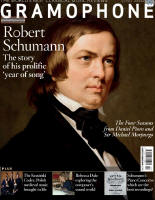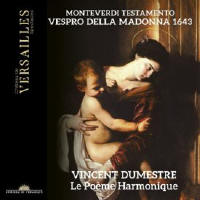Texte paru dans: / Appeared in:
|
|
|
|
|
|
Alternative Monteverdi Vespers that draw speculatively from anthologies printed many years after his move to Venice (ie post-1613) have been attempted plenty of times before, as evident in recordings by artists ranging from Gustav Leonhardt to I Fagiolini. Vincent Dumestre and Le Poème Harmonique choose an imaginary date of 1643 – the year of Monteverdi’s death – and present a Marian Vespers of tenuous liturgical plausibility. Nevertheless, the quality of the composer’s late Venetian-period sacred works shines throughout this opulent recording made in the chapel at Versailles.
Two psalms, a hymn, motet and canticle are taken from Selva morale e spirituale (1641). The choir of 24 singers and a dozen assorted instrumentalists produce muscular heft in Dixit Dominus (secondo); tenor Cyril Auvity rising an octave higher than written at the final cadence gilds the lily even if it has visceral impact. Laudate pueri (primo) is sung by five soloists with appealing contrasts of brilliant light and darkened shade. Salve regina (secondo) is sung with plangent intensity and impeccable facility by two sopranos, accompanied by sinewy lirone, subtle organ, gentle plucked harp and a theorbo. Pianto della Madonna (Monteverdi’s contrafact of the lament from Arianna) is expressed with a sure sense of poignancy by Eva Zaïcik and responsive continuo players. The posthumous Messa a quattro voci e salmi (1650) is the source of three psalms. Laetatus sum (primo) is a witty dialogue between pairs of soloists and couples of instruments over a cheerful ostinato bass. During Nisi Dominus (secondo) sudden pulling back and controlled mysteriousness at ‘panem doloris’ (‘the bread of sorrow’) is self-consciously micromanaged, and various aspects of the colossal interpretation of the doxology are over-baked.
Deus in adiutorium meum intende is Dumestre’s creative adaptation of ‘Altri canti d’Amor’ (Eighth Book of Madrigals, 1638); punching trombones, cornett, fanfares and block-chordal voices make it into an uncanny parody of the famous 1610 opening versicle. The solo motet Ego flos campi, published by Lorenzo Calvi (Venice, 1624), is performed beseechingly by Perrine Devillers. Stabat Virgo Maria is a sacred contrafactum of a madrigal arranged by Aquilino Coppini (1607); Dumestre’s slow pace, tiered dynamics for the full choir, use of brass for emphatic solemnity and manipulative rubato turn it into something peculiarly Brucknerian. Solo voices and a few instrumentalists improvising ethereally over the men singing Gregorian plainchant in an unorthodox Ave maris stella sounds closer to Pärt, or The Hilliard Ensemble and Jan Garbarek’s ECM collaborations, than Palestrina. |
|




